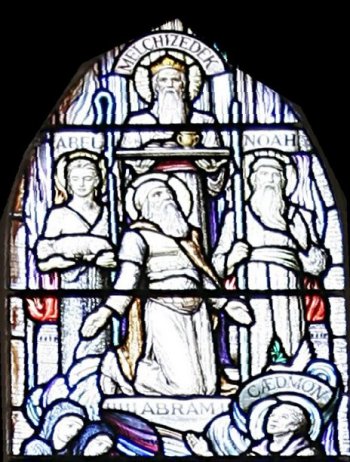
At the top of the left window we have four figures from the early chapters of Genesis: Abel, Abraham and Noah, with the figure of Melchizedek above. Maynard talks about these figures in his sermon of October 31, 1948, where he makes the point that the stories we have about these founders and heroes of the Jewish people are often a mixture of myth and legend. These stories were used as the vehicle for important religious truths, but that does not make the stories history. Nor are they presented as history. Maynard puts it this way:
Now, in our window we have figures that lie right back in the first days. Very important figures, because given to us as pictures for our learning by God's Spirit of wisdom. Whether they are like the Prodigal Son, figures in the mind of the Teacher, or whether they are like the widow who attracted Our Lord's notice as she threw two mites into the Temple Treasury, it matters nothing. If they were not true in the only sense that matters to us, they would not be where they are.
To the left we have the figure of Abel, standing with his shepherd's crook and a lamb that he is about to sacrifice to the Lord in his arms. "And the Lord had respect unto Abel and to his offering" (Gen 4:4.) However, the Lord did not respect the offering of Cain, Abel's brother, and it is made clear that the difference lay in the actions of the two: "If thou doest well, shalt thou not be accepted? and if thou doest not well, sin lies at the door." (Gen 4:7.)